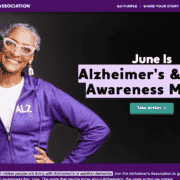Alzheimer’s and Brain Awareness Month
It’s Alzheimer’s and Brain Awareness Month!
The Alzheimer’s Association recently posted an article detailing some common misperceptions about the condition as described by individuals with early-stage Alzhiemer’s Disease (AD).
AD affects over 6 million people in the US alone and is the most common form of dementia, which is characterized by:
- memory loss
- language problems
- changes in mood
- and deficits in thinking and reasoning that interfere with daily life activities.
AD is a disease that progresses over time. AD sufferers in the early stages can still function independently but generally need caregivers as the disease progresses. With increased testing, people are becoming diagnosis earlier than before.
Individuals with a recent diagnosis of Alzheimer’s disease may have a difficult time coping with their diagnosis and need support. Although friends and family members often have the desire to be supportive, they may avoid interacting with the individual with AD due to the fear of negatively impacting their mood.
Avoiding engagement with individuals with AD promotes a sense of isolation and stigma, and can harm their feeling of self-worth. The goal of Alzheimer’s & Brain Awareness Month is to help discuss common misperceptions about AD:
1. Identify Goals Early
Individuals still capable of living independently can benefit from setting goals to accomplish. Friends, family and caregivers can help with planning for their future and maintaining quality of life as their disease progresses.
2. Focus on the Person, Not the Disease
Alzheimer’s patients retain their sense of self until the final stages of dementia and the disease doesn’t affect the person’s choice of daily life pursuits or the relationships they enjoy. Unfortunately, sometimes a diagnosis can change the way they are treated or perceived even those individuals with AD continue to enjoy their usual activities and being social until the later stages of the illness. Listening patiently and avoiding patronization or “elderspeak” is key.
“At every stage of the disease, it is more important that a person interacts with others and less important exactly what is said,” explains Dr. Peter Rabins, professor emeritus at the Johns Hopkins University School of Medicine in Baltimore, MD in Medical News Today article. “People sometimes worry that they will say the ‘wrong thing.’ The key, though, is to talk with the person at whatever level they are able to interact. Talk about old times, good memories, and how their favorite sports team is doing. Go on walks, bring the grandchildren over, or perhaps just sit and hold hands. Even at the end stage of the disease communication through touch can be powerful and rewarding.”
3. Symptom Fluctuation
Depending on the day, individuals with AD may demonstrate improved cognitive function or mood, or they may exhibit more severe symptoms such as anxiety, agitation, irritability, and increased word repetition. Understanding that these behaviors may be beyond the control of AD sufferers can help loved ones and caregivers to me more patient.
4. Early-onset AD
The perception that AD only affects older people may cause younger individual to ignore symptoms or delay getting the help they need. Although the majority of AD cases involve people over the age of 65, younger people account for 5-10% of early-onset Alzheimer’s disease. Early detection can aid in delaying the progression of the disease and fining treatment sooner.
5. Direct Communication
Talking about the person with AD to others (such as a spouse or caregiver) while they are present in the room can be patronizing and isolating. It is difficult sometimes to know how to react after a loved one’s diagnosis, but conversing directly with the person about their health is more likely to be received as being caring and thoughtful.
6. Avoid Making Judgements
Denial is a common reaction among friends and family members after a person is diagnosed with Alzheimer’s, and that can lead to dismissive comments such as “you’re too young” or “you don’t seem to be any different.” These kinds of statements disregard both the psychological impact of diagnosis experienced by the patient and the mental and physical challenges caused by the disease itself.
Alzheimer’s and Brain Awareness Month: Increasing Awareness and Acceptance
Dismantling the stigmatization of dementia through public awareness campaigns can improve how people seek and receive services and support. Encouraging communities to become more ‘dementia friendly’ is an important step:
“We too often view Alzheimer’s through the biomedical lens of disease, but as people living with dementia emphasize, they are still ‘here’ and have dreams and preferences that we must honor, ” states Dr. Joseph Gaugler, the director of the Center for Healthy Aging and Innovation at the University of Minnesota.
Learn more about our Memory Care program at Cadbury Commons.


